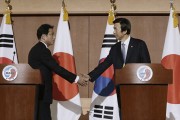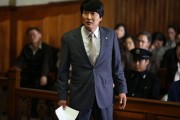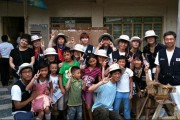The ninety-fifth anniversary of the March 1st Independence Movement found that the division between those Koreans who collaborated with the Japanese and those who marched in protest against them remains stark. The descendants of even the most famous patriots, such as Ryu Gwansun, are living humbly and blaming their condition on the legacy of Japanese rule. Online, there continues to be passionate criticism of those Korean families who willingly aided the Japanese authorities and who continue to prosper in the 21st century.
Article from Yonhap News:
“Descendants of Pro-Japanese Collaborators are well off…” Says Relative of Iconic Independence Activist on March 1st
Ninety-five years ago today, March 1st in 1919 was the historically momentous day when Koreans launched a massive non-violent independence movement against Japan’s colonial rule, only to be brutally repressed after Japanese police opened fire on the peaceful protesters. On March 1st, 2014, how have the descendants of those Korean independence fighters been doing?
Our reporter Han Yeon-hyee has a interview with them.
[Reporter] Lee Jong-yeol was an independence fighter when the Korean Peninsula was under Japanese colonial occupation. He was hauled away by Japanese soldiers before breaking out of prison and joining a group of armed independence fighters. In 1990, he was recognized by the government for his service. About seventy years have passed since the nation’s liberation from Japan’s colonial rule, but he still finds it hard to hold back his anger toward a still-unrepentant Japan.
[Lee Jong-yeol] I spent half of my life as a detainee in a prison after being hauled away by Japanese soldiers at that time. [After the nation’s liberation in 1945] I was old, uneducated, and had no practical skills, so it has been hard for me to make a living, just like everyone in my family dating back to my great grandfather.
[Reporter] Another independent fighter, Kwon Yeong-jwa, tears up when he recalls his painful past, when he suffered as part of a family of independence fighters.
[Reporter] We all know the most iconic figure of the March 1st Independence Movement is Ryu Gwansun. The teenage independence activist is only survived by her nephew Yoo Jang-boo. He feels bitter to see that progeny of pro-Japanese collaborators have become affluent while scions of independence fighters have struggled.
[Yoo Jang-boo] My grandfather [referring to Yoo Gwan-soon] and grandmother fought for the nation’s liberation from Japanese rule. The government told me that I can’t be entitled to a national pensions for both of my grandparents, so I have only received a pension for one grandparent.
Independence fighters sacrificed their lives for the nation’s independence, but the agony and pain our great ancestors felt are still vivid for their offspring on this historic day.
Comments from Daum:
Marie Annetonghanette:
What else needs to be said when the daughter of a pro-Japanese collaborator becomes the nation’s president.
어베뉴:
[Former President Park Chung-hee] got a a paltry compensation for the conscription of Koreans as soldiers and laborers from Japan and spent the money building a nationwide network of highways, making sure to keep the remainder in his pocket. A daughter of a man who sold the country serves as President, and she puts on a show where she calls out on Japan’s wrongdoings.
기러기:
The offspring of independence activists who fought against Japan’s colonial rule at the peril of their lives are poor and get attention only one day a year. But the descendants of pro-Japanese collaborators have enjoyed affluence for generations and taken high office. How can we reconcile with this?
만주의친일파가세운나라: [responding to above]
That we failed to punish pro-Japanese collaborators is a gross crime that will last for generations. Given the sacrifice made by our ancestors for the nation’s liberation, we got off on the wrong foot from the very beginning.
iyaki4132: [repsonding to 기러기]
Don’t be too harsh on ourselves. The failure to punish pro-Japanese figures and settle the colonial legacy can be attributed to the United States military rule after the liberation. In taking control of South Korea, the US occupation forces employed pro-Japanese personnel, resulting in increased clout for pro-Japanese figures. I think this shows the misfortune of a small country. We were powerless at that time.
jamesju_usa:
Tell me about it. The offspring of pro-Japanese collaborators are flourishing while those of independence fighters are given the cold shoulder. The most preposterous thing is that the former awarded governmental merits to the latter.
linige: [responding to above]
Pro-Japanese collaborators gave their offspring a good education with the fortune they amassed, holding onto power from generation to generation, but the offspring of independence fighters were hit the hardest by poverty as their parents were chased by Japanese police. Even after the nation won the independence, pro-Japanese forces with vested interests continued to block their advancement. How could they ever achieve success in such a situation?
ShineDon: [responding to jamesju_usa]
I think there were many little-known independence activists at that time who lived and fought for independence far from the spotlight. Fighting for independence doesn’t mean you have to carry a gun. But is someone’s poverty the fault of their ancestors? it’s been three or four generations since independence, they could have succeeded through their own hard work in the time since then.
내멋에산다:
I think what is more perilous than Abe, who make senseless remarks in his own country, is the offspring of pro-Japanese collaborators, who have become a privileged class on South Korea soil. Even as late as now, we should enact legislation to punish pro-Japanese collaborators and seize their property, yet their offspring are still active in the National Assembly.







